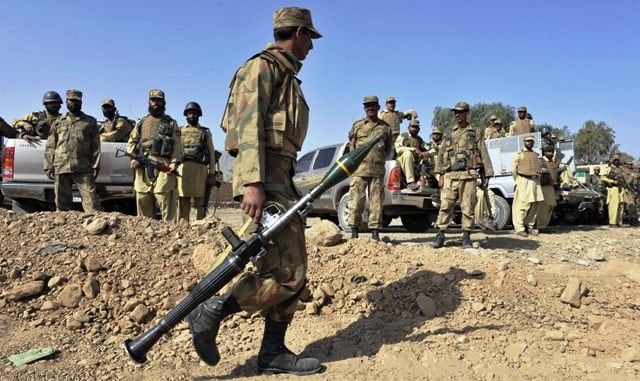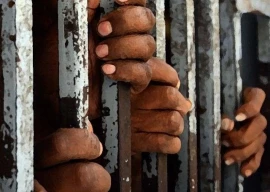
The bill was passed with a number of amendments proposed by the opposition parties by a Senate panel on Wednesday. Faced by fierce opposition, the proposed legislation was granted a lifeline twice by the government through parliamentary resolutions.
According to the procedure, the bill, which has already sailed through the National Assembly, will be reverted to the lower house of parliament once approved by the Senate
Despite having passed the bill amid uproar and protest in the National Assembly, the government seems to have given in to the mounting political opposition to the bill.
Subsequently, to avoid chaos witnessed in the lower house of parliament, the Pakistan Muslim League – Nawaz led administration has incorporated a number of amendments proposed by members of the opposition – including Pakistan Peoples Party (PPP) leaders Aitzaz Ahsan and Mian Raza Rabbani.
At the outset, the committee meeting chaired by JUI-F lawmaker Talha Mahmood, Minister for Science and Technology, Zahid Hamid assured the Senate panel that the government had decided to include all amendments proposed by the opposition led by PPP leaders.
Hamid said that all parties had been taken on board to develop consensus on the law as desired by Premier Nawaz. He also said that the opposition committee had held lengthy discussion with the government before proposing the amendments in the bill.
Following the committee meeting, the bill was unanimously passed along with the proposed amendments.
According to the amendments, the act shall remain in force for a period of two years, instead of three, from the date it would come into force.
Under one of the amendments, the definition of enemy alien has been modified and now means a militant whose identity is unascertainable.
Similarly, the detention period for an accused has been reduced from a period of 90 days to 60 days and special judicial magistrate would give orders of the judicial remand for an extendable period not exceeding more than 15 days.
It has also been recommended that all cases of firing which have resulted in death may be reviewed in a judicial inquiry conducted by a person appointed by the federal government. In comparison, the original bill only provides for an internal inquiry committee constituted by the law enforcement agency concerned.
It has also been added in the bill that shooting orders would be given on the basis of credible prior information about a person and on apprehension of circumstances on the scene that a person can cause harm.
Additionally, it has been proposed that the government shall regulate the internment centres, internment camps, mechanism for representation against the internment orders and judicial oversight of such camps, subject to the provisions of sub-section (2) of Section 9. The judicial oversight was missing in the bill as passed by NA in April.
Another amendment allows the government, joint investigation teams and armed forces to withhold information relating to the location of detainees; however they will not be permitted to hold back such details from a high court or Supreme Court.
According to the amendment proposed by Muttahida Qaumi Movement's Tahir Mashhadi police officers, below the rank of grade 15 will not be authorised to order fire on a suspect. Interestingly, no change has been made regarding armed forces in connection with this clause.
Referring to the Model Town incident, the committee expressed its reservations over the law, which they said might be misused.
COMMENTS (8)
Comments are moderated and generally will be posted if they are on-topic and not abusive.
For more information, please see our Comments FAQ


1725443747-0/Untitled-design-(5)1725443747-0-165x106.webp)














. . . a changeable bill/issue in the court, what to speak of a Islamic Republic even the non-Muslim modern states do not use military weapons on own people (nation) which are meant for only aggressive equally armed enemy, only water guns are used to control a mob, rubber bullets are used for criminals to arrest and investigate, electric rods are used to control a violent individual, no peaceful protest or organized rally is stopped or prejudicely manipulated to cause ciaos just to pass cave era laws . . .
This is how abuse of power is legalised in #Democracy
Agree with Nida
. . . even this bill doesn't give any lawful right to any one to slaughter innocents (childeren/women/old/non militant) in the tribal areas, under the constitution these areas are out of any law enforced, and it had been done by Quad-e-Azam himself, killing of innocents is a trial able offense . . .
A good step by the political leadership of Pakistan. This is how countries like USA prevented another 9/11 and UK prevented another 7/7. There should be no mercy to the terrorists & killers.
. . . licence by sense less to sense less, to abduct and slaughter any one they feel like without any law, not only this but any one who slaughters people will be protected by them (as contractors/subcontractors), as they leading western secular powers are reportedly doing, judiciary has no right to get any information, its something sacred above the law . . .
Why Armed Forces has to be part of this bill? It's goal is to make a code-of-conduct for non-military security forces.
It's these "politically controlled" security forces who Pak Citizens Like taxi drivers, park visitors, shoppers & migrant workers are most afraid of being shot or killed by.